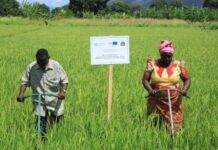
The Board of Directors of the African Development Bank Group approved a loan of €81.9 million to Tunisia to implement the Treated Wastewater Quality Improvement Project For Climate Resilience Building (PAQEE-RCC) at a meeting in Abidjan on 6 December.
To be implemented over the period 2024-2028, the project will improve the treatment of wastewater to make it compliant with the standards for its reuse. It will improve treatment and energy performance through the renewal of electromechanical and electrical equipment and the use of photovoltaic solar energy in 19 water treatment plants across 11 of the country’s governorates. It will also contribute to improving the water balance, to building resilience to climate change and to improving the quality of life for more than 670,000 people.
“This project is an important example of the water-energy-agriculture nexus by upgrading treated wastewater for agriculture and reducing energy costs by using solar energy,” said Malinne Blomberg, Deputy Director-General of the African Development Bank for the North Africa Region.
“By using a non-conventional and non-weather dependent resource, this project will make an active contribution to food security (increased production of olives, dates and other fruit, and forage to increase animal, dairy and meat production) against a background of drought and scarcity of water resources, and food product price inflation on the international market,” explained Belgacem Ben Sassi, the African Development Bank’s regional coordinator for water and sanitation.
More than 3,000 hectares of agricultural land around the water treatment plants involved will be sown using the treated water. The project will create approximately 200 direct temporary jobs (including 20% for women), 50 direct permanent jobs (including 30% for women) and 1,000 indirect jobs, 35% of which will be for women.
This new funding is the Bank’s third operation in the urban sanitation subsector to the benefit of Tunisia’s National Sanitation Office (ONAS). It brings the total amount of commitments in the drinking water and sanitation sector to more than €400 million since 2011. All these operations have helped to improve access for people, especially those in disadvantaged regions, to drinking water and sanitation services, while promoting the reuse of purified wastewater, particularly in agriculture.








